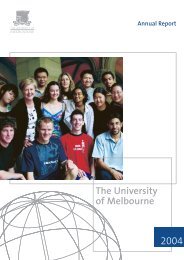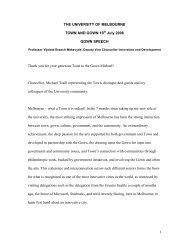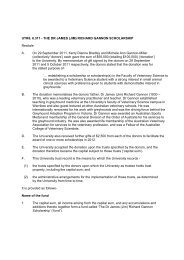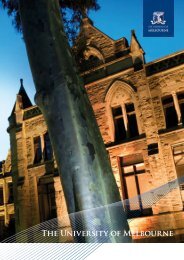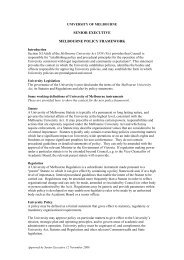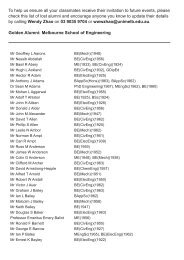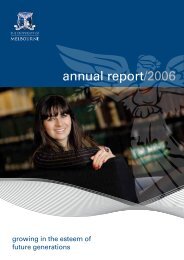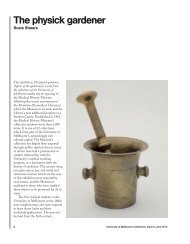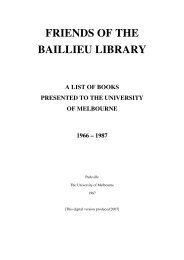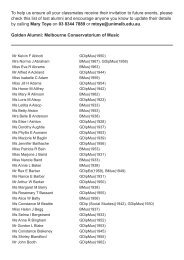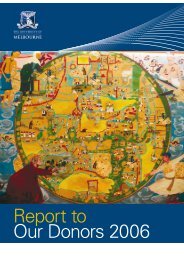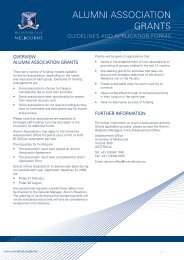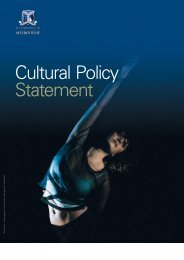2010 International Undergraduate Prospectus nts. u.au
2010 International Undergraduate Prospectus nts. u.au
2010 International Undergraduate Prospectus nts. u.au
Create successful ePaper yourself
Turn your PDF publications into a flip-book with our unique Google optimized e-Paper software.
105<br />
What fees do I pay?<br />
In <strong>2010</strong>, you pay tuition fees based on the particular subjects you<br />
choose to study. The amount you are charged is the sum of the fees<br />
for all subjects in which you enrol.<br />
Subject fees are set within a fixed number of bands based on the<br />
Australian Government Department of Education, Employment<br />
and Workplace Relations discipline classification of the subject,<br />
with different prices charged for undergraduate, graduate and<br />
Community Access Program study. The graduate rates also apply<br />
to any fee-paying research higher degree student.<br />
Other fees<br />
There are other costs associated with your studies that you need<br />
to consider, including compulsory Overseas Student Health Cover<br />
(OSHC; see below).<br />
The Amenities and Services fee funds essential non-academic<br />
student services, such as housing, employment, counselling,<br />
health, financial aid, child care, and academic support services.<br />
Contact the University’s Student Administration for more information<br />
about this fee see: www.studentadmin.unimelb.edu.<strong>au</strong>/<br />
Will my tuition fees ever differ from the published<br />
fee?<br />
The subject fees detailed in this publication relate to 2009 only.<br />
These fees are subject to annual review and may be adjusted to<br />
take into account price and demand factors for each discipline<br />
band.<br />
The University provides a guarantee to international stude<strong>nts</strong> that<br />
the fee will not increase by more than 7 per cent a year in any<br />
discipline for undergraduate subjects and not by more than 10 per<br />
cent a year in any discipline for graduate subjects.<br />
Example of calculating fees:<br />
Chen is an international student who enrols in a Bachelor of<br />
Science in 2009. She enrols in a total of 100 credit poi<strong>nts</strong> (1 EFTSL),<br />
comprising 8 subjects: 4 science subjects (12.5 credit poi<strong>nts</strong> each);<br />
2 commerce subjects (12.5 credit subjects each); and 2 maths<br />
subjects (12.5 credit poi<strong>nts</strong> each).<br />
Chen’s tuition fees for 2009 are calculated as:<br />
(4 x 0.125 x $29,100) + (2 x 0.125 x $28,000) + (2 x 0.125 x $27,400)<br />
= $28,400.<br />
Overseas Student Health Cover<br />
It is compulsory for international stude<strong>nts</strong> to take out Overseas<br />
Student Health Cover (OSHC) while studying in Australia Q.<br />
<strong>International</strong> stude<strong>nts</strong> may choose from four OSHC providers.<br />
Check the Department of Health and Ageing website for details and<br />
conditions:<br />
www.health.gov.<strong>au</strong>/internet/wcms/publishing.nsf/content/healthprivatehealth-consumers-oshc.htm<br />
The University’s preferred OSHC provider is OSHC Worldcare:<br />
www.oshcworldcare.com.<strong>au</strong><br />
The University requires all stude<strong>nts</strong> to purchase visa-length cover at<br />
the time of accepting their offer. This ensures that you are compliant<br />
with the conditions of your student visa and you have up-to-date<br />
health insurance for the entire duration of your study program.<br />
Q Some Norwegian and Swedish stude<strong>nts</strong> have been exempted from OSHC in favour of a<br />
scheme sourced by their governme<strong>nts</strong>.<br />
Costs of Living<br />
We strongly recommend that you investigate the costs of living in<br />
Australia, such as accommodation, food and transport costs, so<br />
that you can plan your stay successfully. Please refer to page 112<br />
for more information about Australian living costs.<br />
Work while studying<br />
If you or members of your family wish to work while you are<br />
studying, you must hold a visa with permission to work. Student<br />
visas that were granted on or after 26 April 2008 <strong>au</strong>tomatically<br />
include permission to work. If your student visa was granted before<br />
26 April 2008 and you have not applied for permission to work, you<br />
and your family members can lodge an application as soon as you<br />
have commenced your studies. The Department of Immigration and<br />
Citizenship (DIAC) prefers on-line applications. Visit www.services.<br />
unimelb.edu.<strong>au</strong>/international/visas/workpermits.html for more<br />
information.<br />
Once permission to work has been granted, you are allowed to<br />
work for a maximum of 20 hours per week while your course is in<br />
session and unlimited hours during periods of vacation. Usually<br />
courses are in session from the first day of semester until the last<br />
day of the examination period.<br />
Work restrictions may vary for family members of international<br />
stude<strong>nts</strong>. Please visit the following web page for more detailed<br />
information on conditions and how to apply.<br />
www.services.unimelb.edu.<strong>au</strong>/international/visas/workpermits




